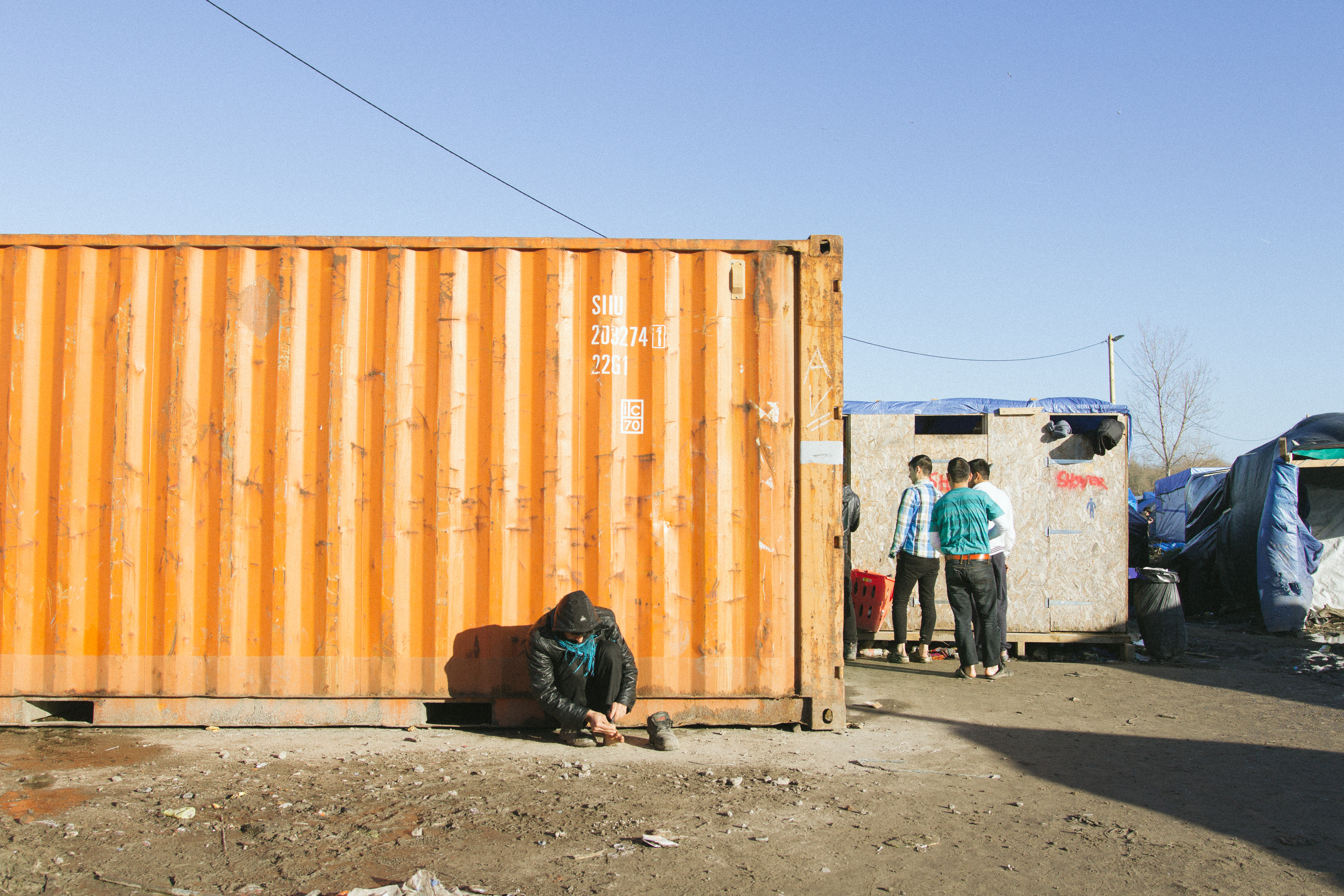A port called Calais.

Originally written for TripMag
300 miles from my own doorstep, 110 miles from London and 20 miles from the UK – this is the ‘Jungle’, one of the largest refugee camps in Europe housing nearly 6000 migrants. It’s not hard to find though, as there is a constant stream of people walking to and from the camps, some volunteers and some refugees. Upon first approach, aside from the numerous riot police and vans dotted along the perimeter, you would assume that you have stumbled across a music festival campsite, albeit the atmosphere is a little more sullen. All you can see is a sea of blue tarpaulins held crudely together with timber frames. These aren’t just the temporary shelters that they are made out to be, but family homes where children are having to grow up in the most formative and influential years of their life.
At the camp there are a wide variety of nationalities, there are Syrian, Afghani, Eritrean, Egyptian, Sudanese and these are the ones I can remember; with many more sub groups around the camp building their own shanty communities. The whole situation is a complete shambles. Everyone I met from helpers to refugees where all fantastic, warm hearted people, merely in the wrong place at the wrong time. With the combined efforts of the French and UK governments this situation could be solved within 3 months however no one wants to take responsibility for these poor people. Yes there may be economic migrants at camp, yes some people may want to enter the UK to reap our benefits and live a comfortable life. However this is a small minority and to be able to distinguish between these few people is enormously hard. So what about the children that will grow up with poor sanitation, no formal school system, no place to call home, what happens to the innocent people caught up in the bureaucracy of this whole debacle?
Upon entering the camp I met up with Soloman (32) who runs the main church in the jungle. I met with him to provide him with some petrol to help heat the church for services in the mornings. He was eternally grateful for the petrol and told me how much of a great help it is to have people helping with the small things. Solomon is well known in the camp, he welcomes everyone and shakes hands with all the volunteers. This type of hope that he provides for the residents of the camp is essential, a place to vent their hopes and dreams is a real human right something that both the UK and French governments really cannot provide. Midway through our conversation he was distracted by a van from the UK that drove past carrying the prefabricated frame for a shelter. This shelter was for a young boy named Badil who was merely 16. That fact took a while for it to sink in; what was I doing at 16? It certainly wasn’t building a shelter to keep me warm and off the sodden floor.
An English volunteer and Badil were assembling the shelter as I offered a hand. I ended up staying for 2 hours helping with the building. The work of the CalaisBuild and Build in Calais charities is essential work taking vulnerable people and supplying them with shelter other than a tent in which they cannot even stand. Some people live in tents for months at a time. Imagine living in a 8ft x 4ft space that is often soaked and damaged. Many people end up developing bronchitis or other respiratory problems.
Badil wasn’t the only young teen living in this shelter, his friend Noorullah who was 15 would be sharing this space with him and possibly two other people, whether they where of a similar age I couldn’t find out. The sheer fact that they are 15/16 was shocking for me, these boys where alone. Around the library, otherwise known as ‘Jungle Books’, I got talking to a group of 4 young men that all lived together in the camp. These men where all from Eritrea and had been travelling for months going through Sudan, Egypt, Libya, Italy and finally France. Sounds like a wonderful holiday doesn’t it? Binyam who hadn’t spoken to his mother in months used my phone to contact her in the UK. Although it wasn’t much help he was overwhelmed hearing her voice, something everyone should be able to do fairly easily.
After mulling around the camp and eating at one of the excellent Afghan restaurants, I decided to leave as I was loosing light. Whilst standing around looking rather lost I met [Name withheld] (21) and Mohammed (20) who started talking to me asking what I was doing. [Name withheld] has already lived in the UK for 6 years in London and had a cockney slang to his accent and Mohammed had lived in Coventry for 5 years. Both weren’t granted asylum even though they had lived in the UK for so long. I asked [Name withheld] what his plans where, his answer probably speaks for a lot of refugees at the camp, “Why would I want to go to a country that doesn’t want me?” How can our government let these people rot here that are able bodied and willing to work. There is a lot of talent and aspirations being wasted away in the mud and cold of a small port town a mere 20 miles from our shores.
